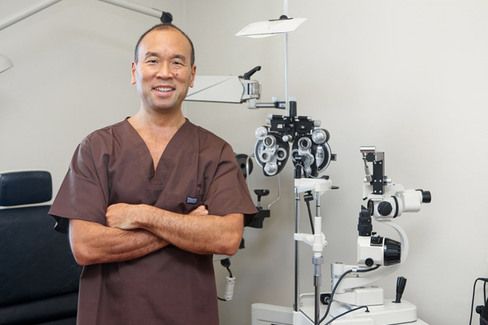The Importance of Scheduling a Diabetic Eye Exam Twice per Year
Diabetic patients are at higher risk of diabetic eye diseases such as diabetic retinopathy, diabetic macular edema (DME), cataracts, and glaucoma. Because these are very serious diseases that can result in vision loss if left untreated, it is important to visit a doctor who can perform an in-depth diabetic eye exam. Dr. Jason H. Nakagawa is an active member of the American Diabetes Association who is committed to serving the needs of diabetic patients in the greater Marina Del Rey, CA, area. He and his friendly team can guide you through each step of your diabetic eye exam and recommend the appropriate number of follow-up visits to help you maintain healthy vision for life.

Importance of Regular Exams
While healthy adults should schedule an eye exam every two years, diabetic patients should visit our office every six months. These more frequent exams are needed to diagnose diabetic eye diseases such as:
- Diabetic retinopathy: Diabetic retinopathy changes the blood vessels in your retina and causes them to leak, which distorts your vision. It is the leading cause of vision loss among diabetic patients.
- Diabetic macular edema: This disease is a consequence of diabetic retinopathy. It causes swelling of the macula, an area of the retina.
- Cataracts: Cataracts affect your lens, making it clouded and distorting your vision. Diabetic adults are two to five times more likely to develop cataracts than adults without diabetes.
- Glaucoma: According to the Glaucoma Research Foundation, patients with diabetes are almost twice as likely to develop glaucoma as patients without diabetes. If left untreated, glaucoma can cause permanent vision loss.
Diabetic eye diseases are very serious and should be diagnosed as soon as possible to prevent vision loss or blindness.
Preparing for Your Exam
Diabetic eye exams should be performed every six months. However, you should schedule an emergency eye exam if you are a diabetic patient experiencing symptoms such as:
- A sudden increase in floaters and flashes
- Dark areas in your field of vision
- Blurred vision
- Trouble focusing
- Any degree of vision loss
To help us better understand your health history, please bring blood reports from your endocrinologist with you to your appointment.
Because many diabetic eye diseases go unnoticed until the onset of vision loss, it is important to schedule a visit to an eye doctor every six months.
Diabetic Eye Exams vs. Regular Exams
In order to perform a comprehensive exam of your vision and detect diabetes-related diseases, Dr. Nakagawa will perform specialized testing, including:
- Fluorescein angiology
- Retinal imaging
- Fundus photography
Compared to a standard eye exam, diabetic patients can expect a few more light sources to be projected into their eyes. These allow us to evaluate your eye health and rule out certain diseases that are more prevalent in diabetics. Because of the brightness of these lights, you can expect afterimages similar to those that remain after taking a flash photo.
Your exam will typically last about 30 to 45 minutes from start to finish.
Schedule Your Next Visit with Us
If you are diabetic, you can prevent vision loss by staying active, maintaining a balanced diet, taking your medications as prescribed, and undergoing exams every six months. To book an exam, contact us online or call our office at (310) 508-4348.
Dr. Jason H. Nakagawa

Dr. Nakagawa has been practicing optometry since 1994. He is a member of multiple prestigious organizations, including:
- American Academy of Optometry
- American Optometric Association
- National Optometric Association
- The National Association of Patient Practitioners
- American Diabetes Association
